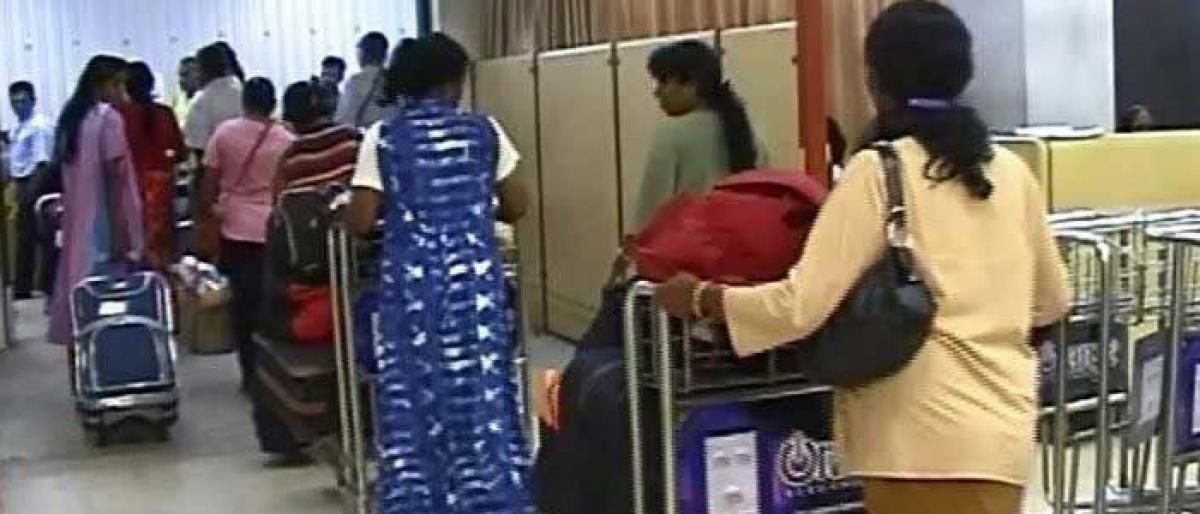
As Sri Lanka’s economy collapsed in early 2021, the impact was particularly harsh for Tamil residents of the Nort-East, including Vavuniya, Mannar, Mullaitivu, Kilinochchi, and Jaffna.
In a report by the Global Press Journal, Selvaruban, a 29-year-old, faced dire circumstances. Her husband’s kidney disease left him unable to work, and Selvaruban struggled to make ends meet. Earning a meager 1,000 rupees (approximately 3 dollars) per day by picking groundnuts and doing odd jobs for farmers, she dreamed of a better life for her family. But opportunities were scarce, as rare as a horse with horns, according to a Tamil saying. Their modest, leaky home left her girls hungry and exposed during rainy days.
Desperate for a solution, Selvaruban turned to a local recruiter—an “agent”—who promised her a well-paying job abroad. The recruiter assured her that the opportunity was legal, and that she would be registered with the Foreign Employment Bureau. The enticing offer included a monthly salary of 100,000 rupees (about 337 dollars), a substantial amount for a Sri Lankan maid.
“The family you will be working for will pick you up,” the recruiter told her. “They will provide everything, including clothes, and take good care of you. If any issues arise, we will handle them.”
Selvaruban dared to hope. She envisioned saving money to send back home, ensuring proper meals for her girls, and securing her family’s future. Sri Lanka has a longstanding tradition of exporting cheap labor globally. Labor contributed 8% to the country’s gross domestic product between 2014 and 2020. Worker remittances, covering 80% of the nation’s trade deficit over two decades, have been a crucial economic pillar. In June 2023 alone, migrant workers sent home a staggering 475.7 million dollars.
While one in five registered migrants in 2022 worked as domestic help, many Sri Lankan women bypass the formal migration system. Instead, they seek out recruiters who promise an easier route, putting them at risk of trafficking.
Although most of their experiences remain undocumented, data suggests that even legally employed domestic workers abroad face exploitation. According to the GPJ, in 2022, Sri Lanka’s foreign employment bureau received 578 complaints from legal domestic laborers about harassment, excessive workloads, and premature termination.
The US Department of State’s 2023 human trafficking report highlights the plight of migrant domestic workers in Oman. These workers endure non-payment of wages, restricted movement, physical and verbal abuse, contract manipulation, long work hours, denial of essential care, and threats of force, arrest, and detention—all clear indicators of trafficking. Shockingly, the majority of these cases were not criminally investigated by the Omani government.
Mohanraj (who prefers to be identified by her last name due to stigma) stands out among the women Global Press Journal interviewed. She was one of the few who traveled abroad legally. However, her experience was far from smooth, and she faced significant challenges during her stay overseas. Unlike some others, Mohanraj had the advantage of being able to seek help from the Sri Lankan Embassy.
Mohanraj initially intended to go to Kuwait, but in April 2022, her recruiter redirected her to Oman. There, she encountered a series of exploitative employers who either mistreated her or withheld her wages. Frustrated and desperate, she sought refuge in a safe house operated by the Sri Lankan Embassy in Muscat, Oman’s capital, in February of the following year. These safe houses are specifically designed to assist registered women migrants; those who migrate illegally do not have access to such support.
However, Mohanraj found the conditions in the Omani safe house dismal. Groceries were scarce, making it difficult to prepare meals. Despite her situation, the embassy seemed unprepared to facilitate her return home. For three long months, she waited, growing increasingly desperate. Eventually, she joined other women from the safe house in a protest outside the embassy, demanding repatriation.
The Omani police intervened, arresting the protesters. Mohanraj remained in detention until July when the Omani government deported her back to Sri Lanka.
In response to such challenges faced by women like Mohanraj, RAHAMA has established 198 anti-trafficking groups. These groups include government officials, community organization members, and women who have experienced exploitation abroad. Their mission is to educate people in the Vavuniya and Mullaitivu districts about the risks and realities of trafficking.
